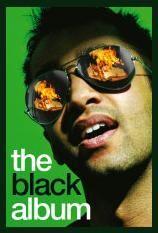The Cottesloe’s seating is famously comfort free but it usually doesn’t matter: the plays staged in the National’s smallest auditorium benefit from the up close and personal interaction between audience and actors and time flies by.
Not so with Hanif Kureishi’s theatrical version of his own novel: The Black Album. The book’s eerily prescient chronicling of events in 1989 is reduced to a sequence of clumsily staged vignettes during which characters dash onto the stage, mouth clunky wooden dialogue at each other, jump up and down for no particular reason and vanish to a blaring strain of generic 80s synth.
The production will tour, this may explain why the set – a box with doors on both sides – only uses about a third of the Cottesloe stage, but it makes things cramped rather than intimate. Such a meal is made of dragging the few items of furniture around that it might have been better to have dispensed with them and relied entirely on the sophisticated projected backdrops that indicate the location of each scene.
The Black Album follows a British-born Pakistani student, Shahid Hasan, from Sevenoaks through his adventures in sex, drugs, Prince’s music and the burning of the Satanic Verses. The best that can be said of Jonathan Bonnici’s vacuous Shahid is that he is a blank canvass onto which everybody else tries to paint what they want to see.
To a certain extent the play is rescued by its topicality and Kureishi’s refusal to allow his readers / audience not to identify with his characters no matter how repellent or wrong-headed their views might be. Everything is exciting to a very young man who has slipped the bonds of his family for the first time: the wrong crowd are always easy to fall in with and you don’t have to try too hard to find your own inner Shahid.
“Wherever they burn books, in the end will also burn human beings.” Heinrich Heine probably wouldn’t make an exception for playscripts…





